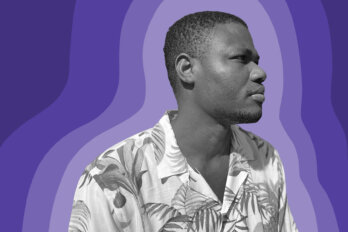Finalist for the 2012 Walrus Poetry Prize
I noticed you first, your birth a paranormal float on that sintered
causeway of white light. As a gift moves us to tears, so your
amatory pleas reamortized all our uses for Moreau and Mastroianni
in La Notte, along Rome’s hospital road, the grace of her hardened outbacks
swayed by illuminations of buxom blondes on ceramic piazzas.
Do I take this man as a full bouquet? I do.
Bus stations when they mattered—when they épatait la bourgeoisie…
rounded the corners of each View-Master slide.
They called me the hyacinth girl, an allusive-historical
moment propice that fairly educated T.S. Eliot on Henry James.
Then James was labelled “pale porpoise” by Vladimir Nabokov.
Quick to judge; aesthetically judgmental. In truth, like a hyacinth,
a limp handkerchief, a little goodbye. Whosoever has reason to object.
Juror, face the accused. Accused, face the juror. There’s that star moment,
the delicate cliffhanger when an Olympian gymnast’s taped feet come into focus
on TV, and it is the cliché, it is the still point of the turning of the world,
from which an analogical chain forms in our minds: torrential rain
to missed balance beam; Ayers Rock, resting as some junked furnace of the gods,
to a motherboard that, from Central Command on the deity’s planet,
was sent the final, last regulatory body for this mortal coil.
In front of the daily glow of your magic lantern, how do you adopt the
depressive position? How can such flickerings bring on suspicion, harvest
your light from perspective studies by Flemish masters? I can’t
know this, because there are some things that remain terrible, sublime,
agglutinous, in the gulf between what I notice and what I should want.
I look back in wonder. I’m always in recovery over such things.
Maybe curatorial velocity is realized with the help
of a lever-operated Scopitone, a one-armed bandit peep show.
Sunshine, so much of it, leaving a purple sheen.
Cinema of a fairy world, chimera of woods.
Cedar- and pine-framed memories of childhood.
The soft relief of those conifers across the lake, long and late.
My melancholias were prequels to my mortsafes.
Armed with the new logic, Paul de Man played the ingenue,
a Swiss Army knife of delusion and semblance. He depended on the kindness of strangers. They fell away, and he became that awful unheimlich: himself.
Get this: Titan arum, the world’s tallest flower, bloomed. A lime green
phallus, shot from the centre of an undulated, cabbage-purple cup of shrubbery.
If Longinus had a vagina. The long story of the vagina.
Pope says science can unite humans with God (Huffington Post).
The long and vagina of it.
Science says Pope can unite God with humans.




